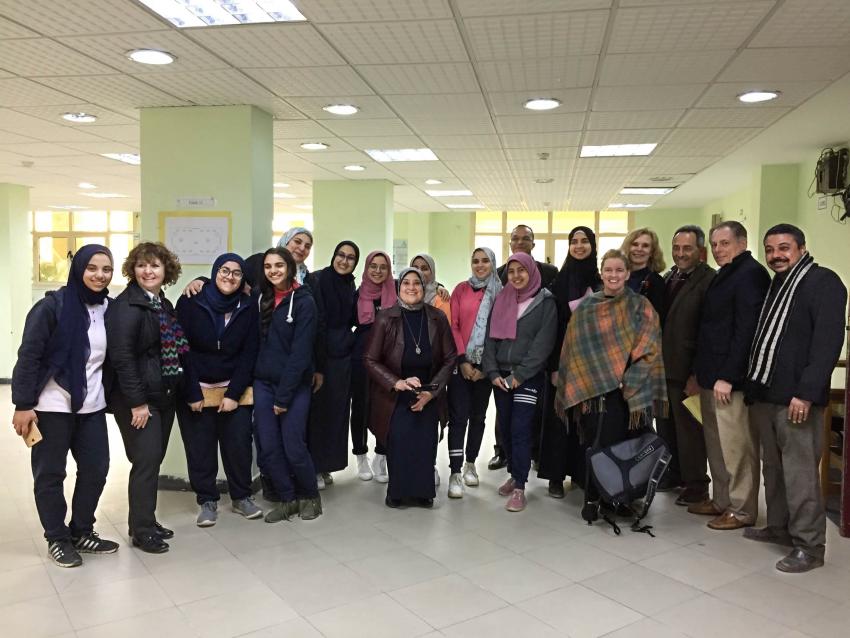Arcadia University Awarded USAID Sub-Contract for STEM Educator Curriculum Development in Egypt

Dr. Kim Dean with Egyptian STEM students and members of the STESSA project.
Arcadia University will be one of the key developers of a new Science, Technology, Engineering and Mathematics (STEM) teacher education program. The University has received a sub-contract from a $24.2 million award from United States Agency for International Development.
The project, STEM Teacher Education and School Strengthening Activity (STESSA), will create a new state-of-the-art teacher preparation program for educators and principals of the 27 advanced Egyptian STEM high schools. The project is managed by the 21st Century Partnership for STEM Education (21PSTEM), a Philadelphia area nonprofit organization.
Since December, faculty from Arcadia’s School of Education, as well as faculty from Drexel and Temple Universities, have visited model Egyptian STEM high schools and witnessed presentations from the students on their semester long “capstone” engineering projects.
“It was remarkable to see the level of work of these Egyptian students and the impact these schools have had in their lives,” said Dr. Kim Dean, assistant professor and chair of Education. “These youth are inspired and actively developing sophisticated skills to take on the global challenges of environmental sustainability. Developing teachers skilled in supporting project-based learning is an important next step and a challenge we are excited to undertake.”
As part of the STESSA project, Drs. Dean and Augusto Macalalag, assistant professor of Education, will be part of the team that helps develop curriculum for the education of future STEM educators over the next four years. They will work with Egyptian STEM faculty to help create or re-develop courses to prepare prospective high school STEM teachers.
Drs. Macalalag and Dean traveled to Egypt during winter break to participate in the initial meetings and workshops. They anticipate returning in the summer.
“It is an honor to work with the STEM educators in Egypt,” said Dr. Macalalag. “It’s a wonderful opportunity for us to support them in planning and developing their teacher preparation programs in order to educate, prepare and mentor the next generation of Egypt’s STEM high school teachers.”
To announce the sub-contract to the University community and provide context for the project and STEM education in Egypt, Drs. Dean and Macalalag, in collaboration with Arcadia’s Office of International Programs, hosted the “STEM Education Symposium: International Research on the Transformational Value of Integrated STEM Curricula in Egypt” on Dec. 13. Professor Emerita Dr. Deborah Pomeroy, director for 21PSTEM’s Research and Project Implementation, and Education alumnus F. Joseph Merlino ’88M, president of 21PSTEM and the STESSA project director, presented on the high school STEM education program 21PSTEM has already implemented.
“Curriculum is like a symphony–if not arranged right, it’s just noise,” said Merlino about the use of integrated curriculum in designing an advanced curriculum for the Egyptian Ministry of Education. “Current student education in the U.S. is too often like a pile of facts. Occasionally, students manage to make sense of otherwise disconnected factoids. But the world is integrated. When it’s put together, students become powerful thinkers. That’s where the value is of an integrated curriculum and we are seeing this in the results of our work in Egypt.”
Dr. Pomeroy and Merlino explained that Egyptian STEM high schools employ a sophisticated integrated curriculum based on Egypt’s grand challenges– a list of social and environmental issues the country hopes to overcome by improving the education and engagement of its citizens. Through an integrated curriculum, students can see the interrelationship between disciplines and fields of study, enabling better understanding.
“Our work draws from research and projects throughout the U.S. and other international communities,” said Dr. Pomeroy. “We gathered the best elements from existing STEM education in the U.S. To the best of our knowledge, nobody has taken all of these elements and put them together into one school system. So, that’s the unique thing, we have had the freedom to help the Egyptians and draw upon all of these elements.”
This press release is made possible by the support of the American People through the United States Agency for International Development (USAID.) The contents of this press release are the sole responsibility of Arcadia University and do not necessarily reflect the views of USAID or the United States Government.


